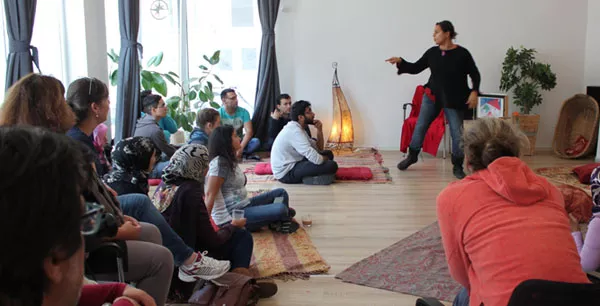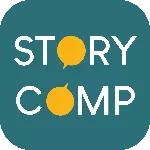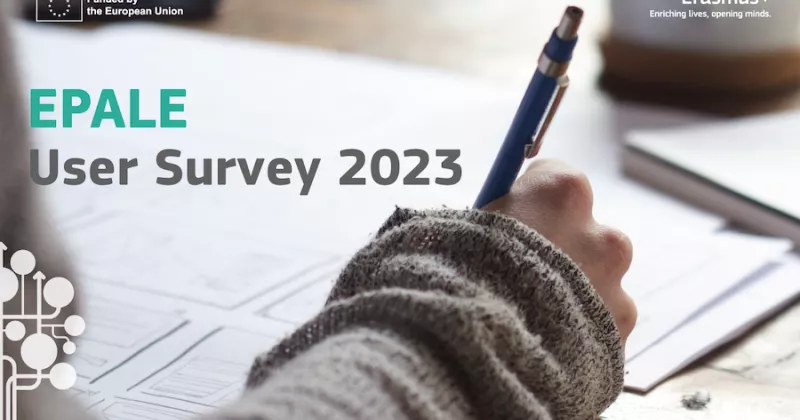Stories as the key to the target group?
By Christian Soyk & Katrin Echtermeyer

Once upon a time ... Storytelling is one of the oldest forms of education. Whether around the campfire thousands of years ago or today, it has always been a way of passing on cultural beliefs, traditions and history, a way of sharing experiences, observations and insights to others. Listening to a good story, however, does not feel like "learning". A well-told story fascinates me, engages me, surprises me, arouses my curiosity and makes me empathise. A well-told story immerses me in its own world, a familiar one or a completely foreign one, a past, present or future one, and it allows me to experience what happened to the narrator or another main character. A well-told story thus has - and now we come back to learning - a special potential to reach people, to carry them along and, in the best case, to motivate them to learn (further). This is one of the fundamental assumptions on which the Erasmus+ project "StoryComp - Competences in Storytelling for Adult Educators in Basic Education and Civic Education", which started in November 2020, is based.
Using the potential of storytelling in adult education
The project partnership, consisting of experts from seven European countries, has set itself the goal of developing a comprehensive blended learning approach in order to be able to systematically use storytelling as a method in two areas of adult education and, in the best case, to establish it: in basic education and in political education. It thus draws on experiences from the previous transnational project "Sheherazade: 1001 Stories for Adult Education" (2011-2013, Grundtvig programme), where it was concluded that "storytelling is highly appropriate to lower the threshold to education and to create innovative and attractive pathways to the acquisition of key competences: literacy, foreign languages, cultural awareness, and social and civic competences." (https://issuu.com/aldenbieseneu/docs/sheherazade-manual, p. 25)
StoryComp wants to use the potential of stories, the potential of storytelling for those areas of adult education in which learners are to be reached on a low-threshold, more emotional than rational level, such as in basic education and civic education. Even though these two areas of education are very different in terms of content, they have even more in common than the search for alternative approaches to their target groups: For both areas, there is also a considerable need for further training on the part of teachers in order to implement low-threshold, non-formal approaches. For basic education in Germany, this is formulated very clearly in the position paper for the National Decade for Literacy and Basic Education, for example (https://www.alphadekade.de/de/ziele-1698.html).
But back to the target group, adult learners, and the design of motivating learning offers. In his study text on “Learning Motivation and Participation in Education", Horst Sieber, professor emeritus of adult education, deals with a wide variety of theoretical approaches and concepts on the motivation of adults to learn and presents the state of learning motivation research. (in German https://www.die-bonn.de/id/3473/about/html/)
Sustainable, motivated learning processes
In an interim assessment of this discussion, Siebert elaborates ten characteristics of sustainable, motivated learning processes (ibid., p. 90f.):
- Connectivity – as the possibility of being able to "couple" new content to experience and previous knowledge
- Novelty – means the subjective novelty and unfamiliarity of content
- Relevance – the question of how "useful, life-serving" new content is. "This does not only mean a professional or everyday practical usability, but also a psychodynamic identification potential, an offer to expand one's sense of life and the world."
- Emotionality – as patterns of emotion associated with a (learning) setting
- Situatedness – meant as "learning integrated into concrete situations of action"
- Physicality – with reference to Damasio's "somatic markers", to body signals that let us know that something is "good for us"
- Networking – on a neuronal level: linking what is new with what is known, new classification of what is known, linking cognitive and emotional levels
- Aesthetisation – addressing multiple channels of perception, "learning with all the senses" and, beyond that, the design of new images of the self and the world
- Perturbation – as a kind of disturbance, irritation of the brain, a deviation from what is expected and usual
- Co-evolution – conceptually taken from evolutionary theory, this refers to the social "co-construction" of reality, learning from and with each other, the joint (learning) progress in a group
If we now look again at the situation of a well-told story, we can see that many of these characteristics apply. Stories offer points of connection to one's own experiences and at the same time convey new aspects, perspectives, contents. We can "get something out" of stories and feel physically comfortable in the situation in which the story is told – with all the tension and relaxation that good storytelling can create. Stories bring up “pictures” in our imagination and they complement, expand, contrast the images we have of ourselves, of the people around us and of the world. Well-told stories may also surprise us. In any case, a story is something that is shared - at least between the person telling and the person listening, but often in a group.
Siebert states with regard to the characteristics of sustainable, motivated learning processes: "Broadly speaking, the more these characteristics are present, the more intense is the motivation and the more sustainable the learning activity". (ibid., p.90) Against this background, well-told stories do indeed have a high potential.
StoryComp: a blended learning approach to competence development in storytelling for adult educators
But storytelling has to be learned - and can be learned. This is shown by the success of the project "Sinbad" (http://storytelling-online.eu), which was awarded as "Best Practice" by the EU and in which a blended learning course for further training in free storytelling for people working in early childhood education was developed and tested. The experiences from this project flow into the current StoryComp project just as much as those from the above-mentioned "Sheherazade" project – in the current project partnership, institutions from both predecessor projects are working together. What can be expected from StoryComp in concrete terms?

Within the framework of this project, the following three products will be developed, which build on and interlock with each other:
- The Methodical Framework
... as the basis for the StoryComp concept, which aims to provide self-directed training opportunities for adult educators in storytelling as a creative method for promoting competence acquisition among adult learners in basic education and civic education.
- The Online Platform
... as the "heart" of the project and a prerequisite for adult educators to be able to fundamentally acquire the method of storytelling with the online course available there free of charge and to have the necessary resources for its implementation and application in practice. This includes, for example, a sorted European collection of suitable stories, video tutorials on techniques and methods as well as instructions for storytelling workshops. The platform will also offer the possibility of a virtual storytelling community, where adult educators can network with others, share experiences and discuss.
- A Guide for Storytelling Workshops with Adult Educators
... as a practice-oriented, modular and thus directly and flexibly applicable guide with the aim of motivating and guiding adult educators to train, deepen and improve their storytelling skills together with colleagues in workshops.
All products of the project will be available as open educational resources on the StoryComp platform, freely usable and adaptable for own use. The first results – the publication of the Methodological Framework – can already be expected in autumn 2021. The project team will of course keep you up to date here and will also tell a story about the project: The partners will not only evaluate their experiences and findings during the project period in a classic form, but will compile them in a multi-part story that – we hope – will encourage you to experience, think and learn along with them.
And they all lived happily ever after...

The StoryComp project is funded by Erasmus+ under project number 2020-1-DE02-KA204-007574. VHS Leipzig (Germany) is coordinating the project, and partners are Die Wiener Volkshochschulen (Austria), PLATO (Netherlands), CVO VOLT (Belgium), Fabula Storytelling (Sweden), Pistes Solidaires (France), LU Jesenice (Slovenia) and Wisamar Bildungsgesellschaft gGmbH (Germany). www.wisamar.de/storycomp/



